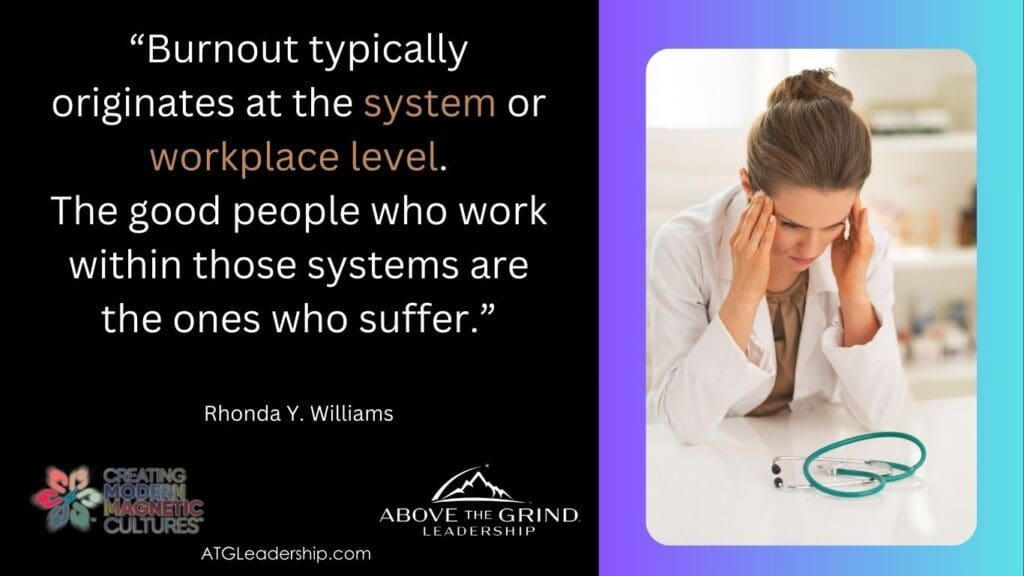What is burnout and what can we do about it?
The professional landscape of the 21st century, characterized by rapid technological advancements and evolving workplace expectations, has led to both opportunities and challenges for today’s workforce. One significant challenge facing many professionals today is burnout. This blog post delves deep into understanding work-related burnout, its causes, symptoms, and how fostering leadership skills and emotional intelligence can help address it.
What is Burnout?
Burnout is a state of chronic physical and emotional exhaustion, often accompanied by cynicism and feelings of detachment from one’s job responsibilities. It’s more than just everyday stress; burnout is persistent and can lead to a significant decline in work performance and well-being.
What Causes Burnout?
- Excessive Workload: Regularly having too much to handle or unrealistic deadlines can be a direct route to burnout.
- Lack of Control: Feeling that you don’t have control over your work or its outcomes can lead to feelings of helplessness.
- Insufficient Rewards: Not receiving adequate compensation, acknowledgment, or satisfaction from work.
- Lack of Community: Feeling isolated at work or being in a hostile environment.
- Mismatched Values: A mismatch between your core values and the company’s.
- Lack of Clarity: Unclear job expectations or roles.
- Micro-management: Constant scrutiny and lack of trust from superiors.
Symptoms of Burnout
- Physical Symptoms: Fatigue, sleep disturbances, frequent illnesses, and headaches.
- Emotional Symptoms: Feelings of hopelessness, self-doubt, detachment, and lack of motivation.
- Behavioral Symptoms: Withdrawing from responsibilities, using food, drugs, or alcohol to cope, taking out frustrations on others, and decreased work performance.

Tackling Burnout with Leadership Skills and Emotional Intelligence
Leadership skills and emotional intelligence can be instrumental in both preventing and addressing burnout. Here’s how:
Self-awareness: Being emotionally self-aware allows you to recognize early signs of burnout in yourself and in team members. When you understand your emotional triggers and can identify when you’re feeling overwhelmed, you can take proactive measures.
Self-regulation: Leaders who can manage their own emotions, particularly in stressful situations, set a positive example for their teams. By demonstrating self-control and adaptability in the face of challenges, leaders can foster a more resilient and positive work environment.
Motivation: Leaders with a passion for their work can inspire their teams. When you have a clear vision and demonstrate commitment, it motivates others to follow suit, reducing the feeling of aimlessness that can lead to burnout.
Empathy: An empathetic leader understands and respects the emotions of their team members. Recognizing when someone is struggling and offering support or adjustments can significantly reduce burnout factors.
Social Skills: Effective communication is key. Leaders need to create an environment where team members feel they can voice their concerns, ask for help, or suggest changes without fear of repercussions.
- Follow-Through: When leaders identify system factors contributing to burnout, taking measured and impactful action can improve team trust and reduce burnout.
Other Remedies for Burnout
- Take Breaks: Ensure regular short breaks during the day and longer breaks or vacations when possible.
- Set Boundaries: Be a fierce steward of your personal time. Others cannot honor boundaries you do not set.
- Seek Support: Talk to supervisors, HR, or consider professional coaching or counseling.
- Practice Self-care: Engage in activities that help you relax and recharge. You deserve it!
- Re-evaluate Priorities: Sometimes, realigning your work and personal goals can provide clarity and a renewed sense of purpose.
Burnout is a real and pressing concern in today’s work environment. Recognizing its causes and symptoms is the first step toward prevention and recovery. By fostering leadership skills and emotional intelligence, both at an individual and organizational level, workplaces can create a more supportive, understanding, and resilient environment, helping to mitigate the adverse effects of burnout.
Taking care of your well-being ensures not only personal health but also improves long-term professional success.
Remember, you do not have to do this alone. There is strength in seeking support to accelerate your burnout recovery.
Register For Our Upcoming Leadership Accelerator Cohort!
Calling all leaders and visionaries! Join us on an extraordinary leadership journey with our upcoming Leadership Accelerator Cohort. This is your chance to unlock your leadership potential, collaborate with a dynamic global community, and gain insights from seasoned mentors who have walked the path of success.
Don’t miss out on this transformative experience for yourself or deserving leaders on your team. Learn more and register today. Your team will thank you!
Need a custom cohort for your team? Contact us to discuss potential solutions.
Share this article if you believe others may find value in it.
Let’s partner to help your team overcome obstacles and make measurable success.
We’ve got this.
Schedule a consultation today!
– – – – –
Nonsense-free, Quantitative Results.
Global Leadership Training and Executive Coaching
I help leaders and organizations resolve or leverage whatever is in their way.

